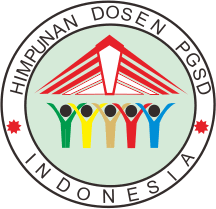Pengaruh model problem based learning berbantuan QR code terhadap kemampuan berpikir kreatif dan hasil belajar siswa
Abstract
This research aims to determine the effect of the Problem Based Learning learning model assisted by QR Code on measurement material on creative thinking abilities and learning outcomes for fifth grade elementary school students. This type of research is quasi-experimental. Pre test-post test non equivalent control-group design method. The type of data taken is the implementation sheet of creative thinking abilities and learning outcomes. The instrument used for this research used essay questions. The data analysis technique uses the SPSS 18 anacova test. The calculated beta intercept value is 56.124, while the creative thinking pre-test beta value is 0.269, so a positive relationship is obtained with a small influence. Meanwhile, in calculating the estimated parameters for the intercept and pre-test learning outcomes, it was found that the intercept beta value was 67.885, while the pre-test beta value for learning outcomes was -0.025. So the estimated parameter calculations have a negative relationship with a small influence. The results of calculating the intercept value for learning outcomes and creative thinking both show a significance of 0.000, so H0 is rejected and H1 is accepted. The Problem Based Learning model has a positive effect on the ability to think creatively because the x value and y value both increase and decrease. Meanwhile, learning outcomes have a negative effect because between the x value and the y value there is a difference in up and down in the value results so that it can be applied at school. The Problem Based Learning learning model assisted by QR Codes can be implemented widely in learning activities, besides that the Problem Based Learning learning model can be combined in addition to using barcodes.
Full Text:
PDFRefbacks
- There are currently no refbacks.


